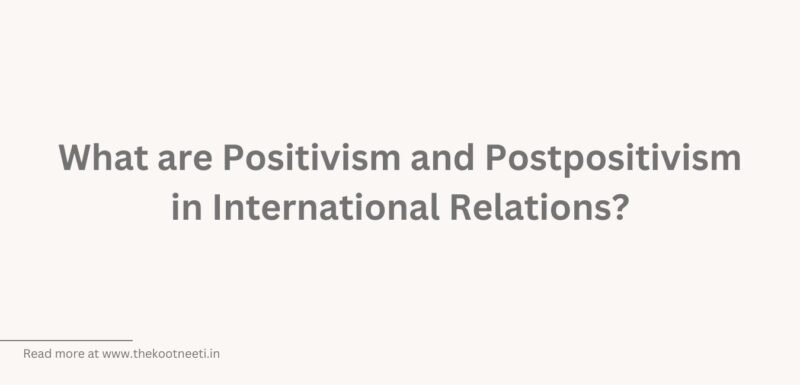What are Positivism and Postpositivism in International Relations?

Positivism is a philosophical approach that emphasizes the use of empirical evidence and scientific methods to understand and explain social and political phenomena. In the field of international relations, positivism is a perspective that emphasizes the role of objective, observable facts and objective analysis in understanding and explaining international politics.
Positivist approaches to international relations are often associated with the scientific study of international politics and seek to identify universal laws and patterns that govern international relations. Positivist approaches to international relations often rely on quantitative data and statistical analysis, and aim to develop theories that can be tested and supported by empirical evidence.
Positivist approaches to international relations have been influential in the development of international relations theory, and have contributed to the development of a number of important theoretical frameworks, such as realism and liberalism. However, positivism in international relations has also been the subject of much criticism, with some scholars arguing that it is too narrow in its focus on observable facts and that it does not adequately take into account the complexity and contingency of international politics.
Post-positivism
Postpositivism is a philosophical approach that builds on positivism, but acknowledges the limitations and limitations of positivist approaches and seeks to incorporate a more diverse range of perspectives and approaches.
In the field of international relations, postpositivist approaches seek to move beyond the narrow focus on observable facts and objective analysis that characterizes positivist approaches, and to incorporate a more diverse range of perspectives and methodologies. Postpositivist approaches to international relations often draw on qualitative data and interpretive methods, and seek to understand the complexity and contingency of international politics.
Postpositivist approaches to international relations have emerged in response to criticism of positivist approaches, which are seen as too narrow in their focus on observable facts and as not adequately taking into account the complexity and contingency of international politics.
Postpositivist approaches to international relations have been influential in the development of alternative theoretical frameworks, such as constructivism and critical theory, and have contributed to a more nuanced and complex understanding of international politics.
Differences with Constructivism
Post-positivism and constructivism are two different philosophical approaches to studying international relations.
Post-positivism is an approach that emerged in the late 20th century as a response to positivism, which is a traditional, scientific approach to studying international relations. Post-positivism acknowledges that social science is subjective and that our understanding of the world is shaped by our perceptions and interpretations. It emphasizes the importance of context and the role of language and communication in shaping our understanding of the world. Post-positivism is concerned with understanding the ways in which people make meaning and create knowledge about the world.
Constructivism, on the other hand, is an approach that emphasizes the role of ideas, beliefs, and identities in shaping international relations. Constructivists argue that international relations are not driven by material interests or power dynamics alone, but also by the shared ideas and beliefs that shape the way states and other actors interact with each other. Constructivism emphasizes the importance of social constructions, such as international norms and identities, in shaping international relations.
In summary, post-positivism and constructivism are both concerned with understanding the subjective and interpretive aspects of international relations. However, post-positivism focuses on the ways in which people make meaning and create knowledge, while constructivism emphasizes the role of ideas, beliefs, and identities in shaping international relations.


















